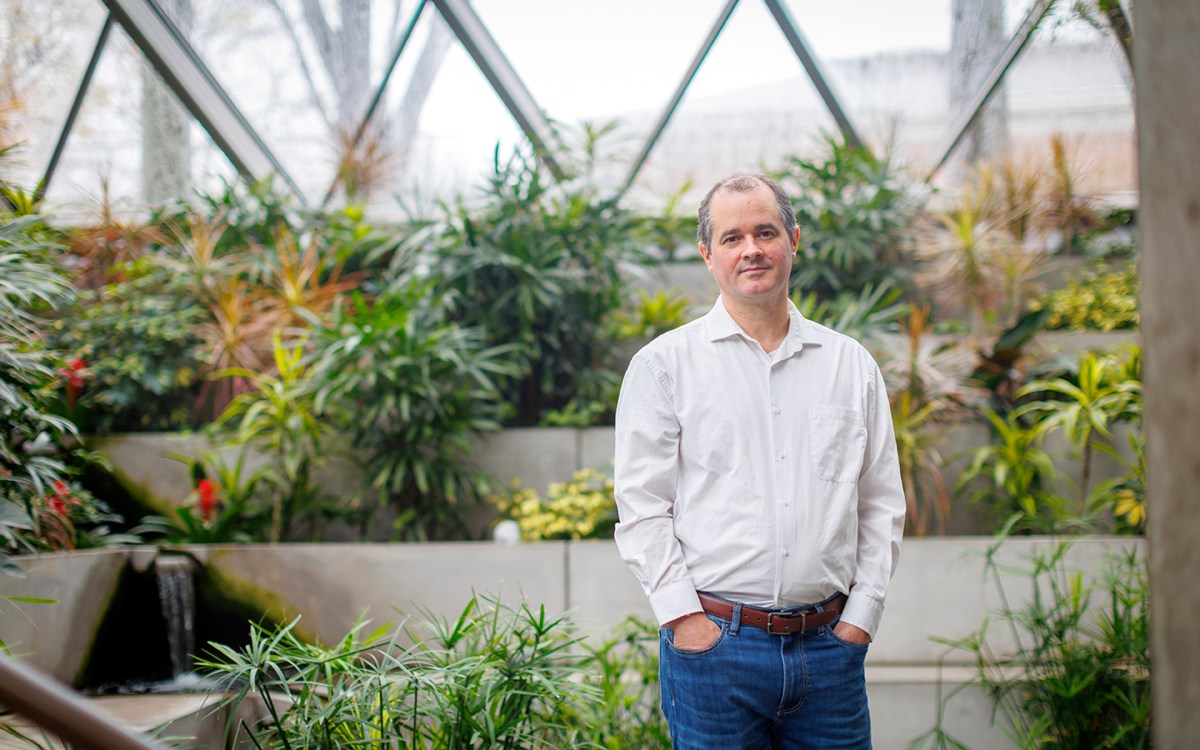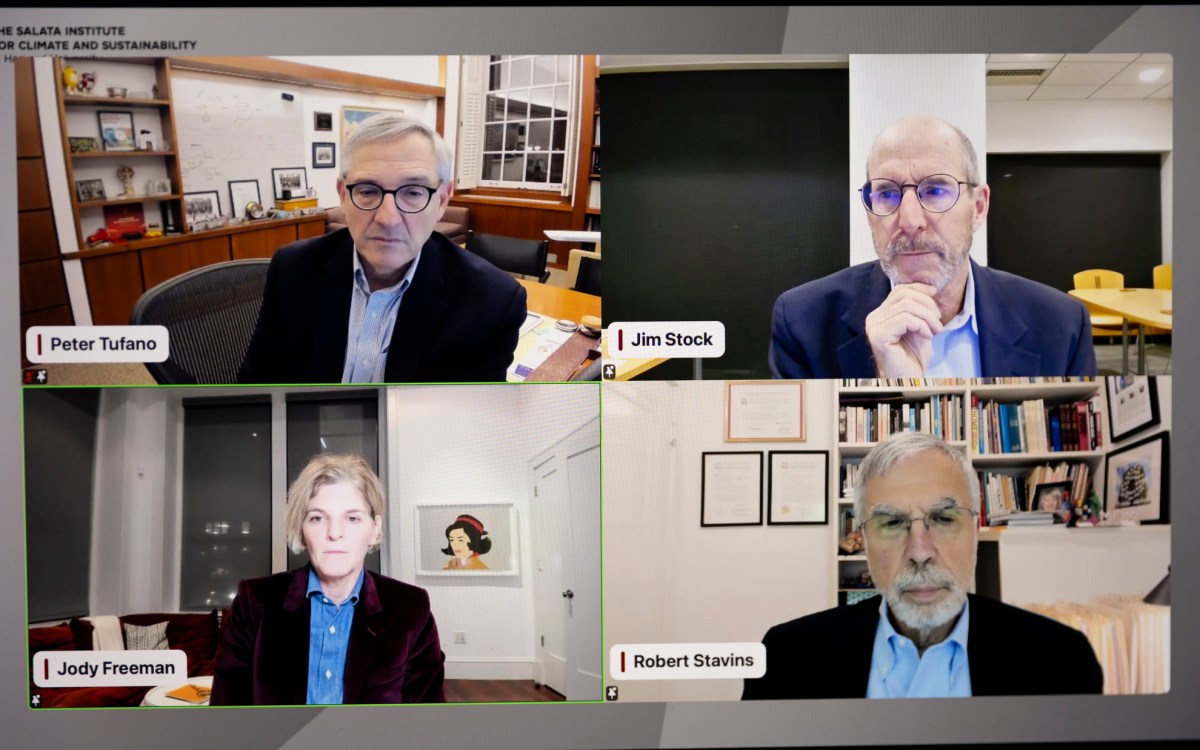Science & Tech
-

A small slice of time
An NSF project builds a special camera to shoot the night sky, light up dark matter, and map the Milky Way
-

Real reason ACL injury rate is higher for women athletes
Study finds flaw in key sports science metric

-

Can people change?
One thing is certain in the new year — we’ll evolve, with or without resolutions. In podcast, experts consider our responsibility.
-

A common sense, win-win idea — and both right, left agree
Poll measures support for revenue-sharing plan on renewable energy that helps states, localities, and environment

-

Climate change experts see dark clouds ahead
Salata Institute panelists predict legal, regulatory setbacks and areas of hope as Trump administration prepares to take over
-

Ever wonder why your dog does this?
Study decodes neural mechanism that causes hairy mammals to shake their fur when wet

-
Lecture ‘Can’t you see I’m busy’ addresses ‘interruption management’
You’ve opened a Microsoft Word document and are just about to write. Feel good? No. Instead of inspiration, along comes Clippy, the annoying little pop-up man with his bobbing eyebrows and balloon full of intrusive questions. “It looks like you’re writing a letter. Would you like help?”
-
Solar system’s twin has two asteroid belts
Astronomers have discovered that the nearby star Epsilon Eridani has two rocky asteroid belts and an outer icy ring, making it a triple-ring system. The inner asteroid belt is a virtual twin of the belt in our solar system, while the outer asteroid belt holds 20 times more material. Moreover, the presence of these three rings of material implies that unseen planets confine and shape them.
-
Records dating back to Thoreau show some sharp shifts in plant flowering near Walden Pond
Drawing on records dating back to the journals of Henry David Thoreau, scientists at Harvard University have found that different plant families near Walden Pond in Concord, Mass., have borne…
-
Solar system’s young twin has two asteroid belts
Astronomers have discovered that the nearby star Epsilon Eridani has two rocky asteroid belts and an outer icy ring, making it a triple-ring system. The inner asteroid belt is a…
-
Gore: Universities have important role in sustainability
Former vice president Al Gore ’69 addressed a crowd of 15,000 in chilly, leaf-strewn Tercentenary Theatre Oct. 22, 2008, delivering the keynote address in a multi-day celebration of the University’s commitment to sustainability.
-
GSD lecture and panel address ‘Designing for Sustainability’
Interest in green building is high at the Harvard Graduate School of Design (GSD), judging by the attendance at a lecture Tuesday (Oct. 21) in the Stubbins Room at Gund Hall. “Designing for Sustainability” was part of the popular and event-packed sustainability celebration instituted this year by Harvard President Drew Faust.
-
Ban calls for international efforts
United Nations Secretary-General Ban Ki-moon called on the United States to combat the “imminent threat” of climate change, both by reducing its own greenhouse gas emissions and by leading the effort to craft a successor to the Kyoto Protocol.
-
Controlling greenhouse gases, universities, individuals matter
From 1850 to 2000, the use of fossil fuels worldwide grew 140-fold, a practice that has gradually filled the Earth’s atmosphere with warming gases.
-
Black holes are the heart of galaxies
Astronomers think that many — perhaps all — galaxies in the universe contain massive black holes at their centers. New observations with the Submillimeter Array now suggest that such colossal black holes were common even 12 billion years ago, when the universe was only 1.7 billion years old and galaxies were just beginning to form. The new conclusion comes from the discovery of two distant galaxies, both with black holes at their heart, which are involved in a spectacular collision.
-
Harvard’s green commitment
Harvard’s fall 2008 sustainability celebration included panels, tours, fairs, film screening, coffee-house style discussions – and the very convenient appearance of former Vice President Al Gore.
-
A protein found to restore blood glucose in type 1 diabetes model
A protein made by the liver in response to inflammation and used to treat patients suffering from a genetic form of emphysema has been shown to restore blood glucose levels…
-
HSCI creates Web presence for research
The Harvard Stem Cell Institute (HSCI) and the Harvard Initiative in Innovative Computing (IIC) have launched an online stem cell textbook that seeks to engage and inform the stem cell community as it presents up-to-date stem cell science in a format useful to scientists and students.
-
Star quest knowledge provides new view of ourselves
In a basement laboratory at the Harvard-Smithsonian Center for Astrophysics (CfA), surrounded by instruments built to detect the universe’s distant secrets, sits a machine that will help us look not outward to the stars, but inward at our own bodies.
-
Arctic ice is thinning steadily
There was a polar bear sighting at Harvard last week. At Pforzheimer House on Thursday (Oct. 2), global warming expert James J. McCarthy delivered a crisp summary of how fast ice is melting in the Arctic — and why we should care. The audience of 80 took in his companion slide show, including images of ice-stranded polar bears.
-
Exelon executive offers regulations, incentives to ‘green’ energy supply
The head of the nation’s largest nuclear power plant owner decried America’s lack of an energy policy Monday night (Oct. 6) and laid out a five-point plan featuring a mix of new regulations and financial incentives for coal, nuclear, and renewable power sources as a way to ‘green’ America’s energy supply.
-
Hansjorg Wyss gives $125 million to create institute for biologically inspired engineering
Engineer, entrepreneur, and philanthropist Hansjörg Wyss MBA ’65 has given Harvard University $125 million to create the Hansjörg Wyss Institute for Biologically Inspired Engineering. Investigators at the Wyss Institute (pronounced…
-
Smoking and solid-fuel-burning in homes in China projected to cause millions of deaths
If current levels of smoking and biomass and coal fuel use in homes continues, between 2003 and 2033 there will be an estimated 65 million deaths from chronic obstructive pulmonary…
-
Environmental report card grades Harvard A-
Harvard received the highest ranking in a recent “College Sustainability Report Card” that graded the green credentials of 300 colleges and universities. Harvard received high ranks for an array of activities, including recycling, green buildings, energy supply, transportation, and student involvement. Overall, the University was among 15 nationwide that received the top A- grade, earning Harvard the title of Overall College Sustainability Leader.
-
Technique offers close-ups of electrons and nuclei
Providing a glimpse into the infinitesimal, physicists have found a novel way to spy on some of the universe’s tiniest building blocks. Their “camera,” described this week (Oct. 1) in the journal Nature, consists of a special “flaw” in diamonds that can be manipulated into sensitively monitoring magnetic signals from individual electrons and atomic nuclei placed nearby.
-
Global warming threatens his nation’s existence, a president warns
During a talk at Harvard, the leader of the South Pacific island nation of Kiribati laid out an extraordinary plan that would scatter his people through the nations of the…
-
Harvard Forest:
Harvard may be rooted in Cambridge, but it has a lot more roots in the small north-central Massachusetts town of Petersham. That’s where you’ll find the woods, streams, and fields…
-
Island nation president plans for extinction
The leader of the South Pacific island nation of Kiribati laid out an extraordinary plan Monday (Sept. 22) that would scatter his people through the nations of the world as rising sea levels submerge the islands they have called home for centuries.
-
J. Richard Bond awarded Gruber Prize at CfA
Theoretical work on the evolution and structure of the universe landed Canadian cosmologist J. Richard Bond the 2008 Cosmology Prize of the Peter and Patricia Gruber Foundation, awarded Sept. 17 at the Harvard-Smithsonian Center for Astrophysics (CfA).
-
Three Harvard faculty members net MacArthur fellowships
Three biologists — one current and two future faculty members at Harvard — have won MacArthur Foundation “genius” grants, $500,000 no-strings-attached awards intended to encourage creativity, originality, and innovation in…
-
New class of hormone from “healthy fat cells” benefits body metabolism in mice
Scientists at the Harvard School of Public Health (HSPH) have identified in mice a newly discovered class of hormones — lipokines. In tomorrow’s issue of the journal Cell they report…
-
David Korn named University’s vice provost for research;
David Korn, a former Dean of Stanford University School of Medicine long known as a leader in research policy and science administration, will become the University’s vice provost for research,…
-
Collider startup brings ATLAS to life
Scientists at Harvard and around the world held their breath Wednesday (Sept. 10), as colleagues switched on the most powerful particle accelerator ever built, the Large Hadron Collider at CERN, the particle physics laboratory in Geneva.
-
ATLAS detector seeks to illuminate universe’s mysteries
Scientists at Harvard and around the world held their breath earlier today, as colleagues switched on the most powerful particle accelerator ever built, the Large Hadron Collider at CERN, the…
-
NHGRI/NIH awards team $6.5M to advance DNA sequencing using Nanopores
The National Human Genome Research Institute (NHGRI), part of the National Institutes of Health (NIH), awarded a $6.5 (over 4 years) grant to a team of Harvard University researchers to…
-
Value of direct-to-consumer drug advertising oversold, study finds
Direct-to-consumer advertising may not be giving big pharma such a big bang for their five billion bucks after all. Despite the billions spent on bringing drug marketing campaigns straight into…

